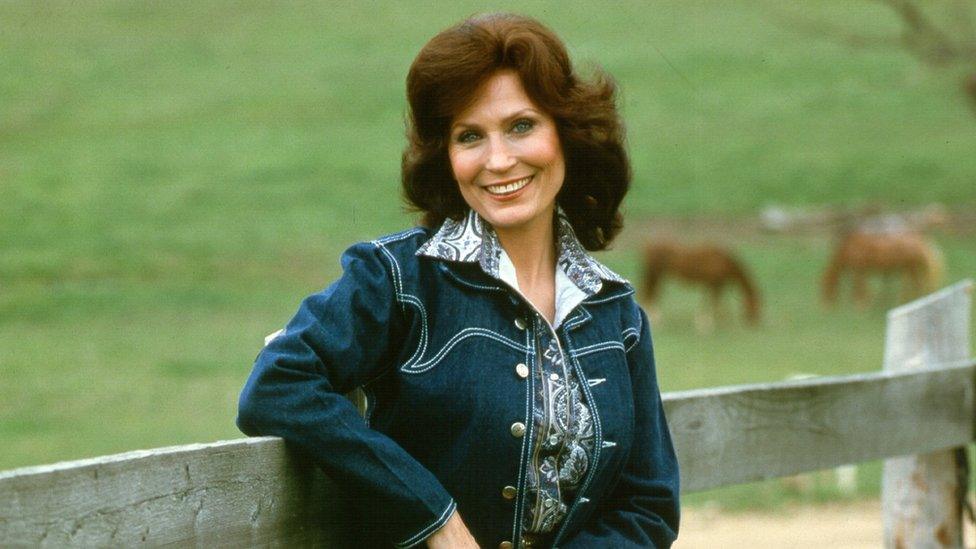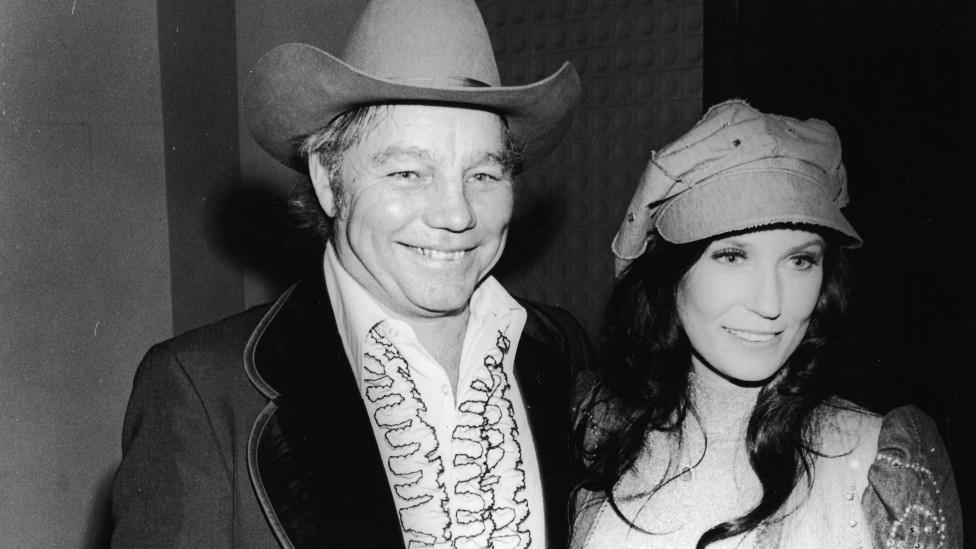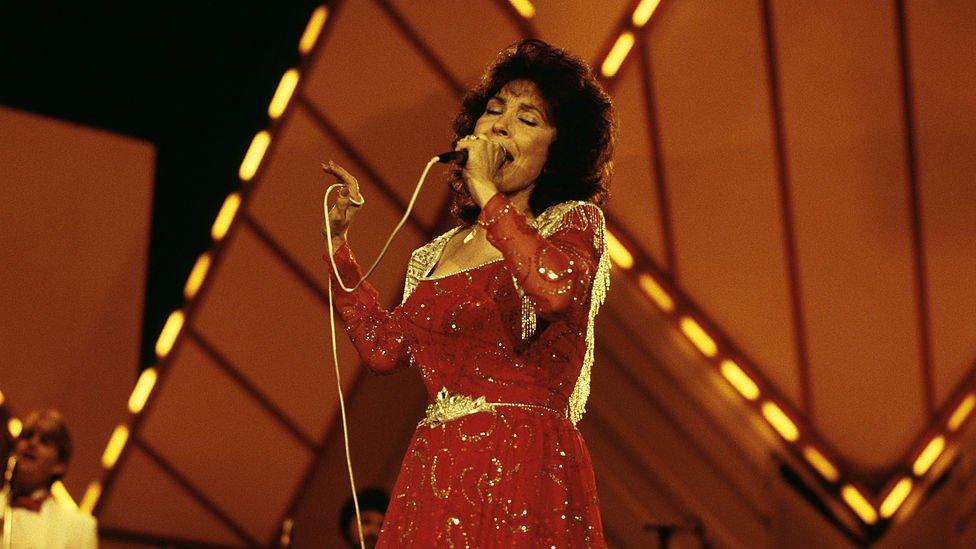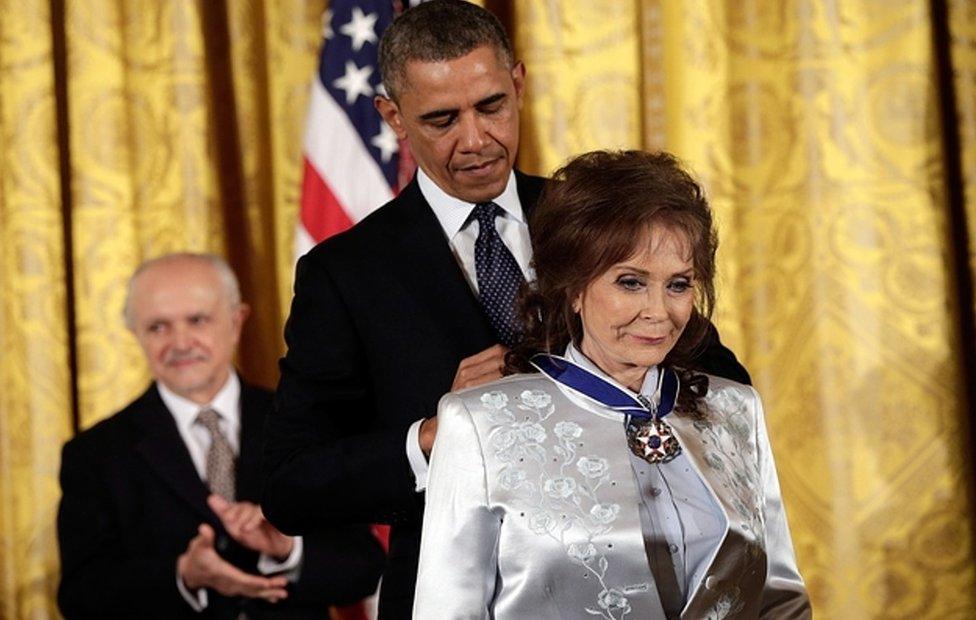Queen of Country music Loretta Lynn dies aged 90
- Published

Lynn's hits included Don't Come Home A-Drinkin', Honky Tonk Girl and the feminist anthem, The Pill
Loretta Lynn, whose songs of strength and independence made her a standard-bearer for women in country music, has died at the age of 90.
Known as the Queen of Country, her songs were rooted in real-life experience, most notably on the autobiographical Coal Miner's Daughter.
Other hits included Don't Come Home A-Drinkin', Honky Tonk Girl and the feminist anthem, The Pill.
Lynn's family said she died on Tuesday at her home in Tennessee.
"Our precious mom, Loretta Lynn, passed away peacefully this morning, October 4th, in her sleep at home in her beloved ranch in Hurricane Mills," the family said in a statement.
They asked for privacy as they grieve and said a memorial would be announced later.
Humble beginnings
The singer was born Loretta Webb in a one-room log cabin in Butcher Hollow, Kentucky in 1932. She was the second of eight children.
Just as she would later sing in Coal Miner's Daughter, her family eked out a living during the Depression, with her father earning a "poor man's dollar" by working all night in the coal mines, and all day in the fields "a-hoein' corn".
Allow YouTube content?
This article contains content provided by Google YouTube. We ask for your permission before anything is loaded, as they may be using cookies and other technologies. You may want to read Google’s cookie policy, external and privacy policy, external before accepting. To view this content choose ‘accept and continue’.
The family made its own entertainment - her mother played guitar, with her father accompanying on banjo - and she grew up on the songs of the Carter Family.
"I was singing when I was born, I think," she told the Associated Press in 2016. "Daddy used to come out on the porch where I would be singing and rocking the babies to sleep.
"He'd say, 'Loretta, shut that big mouth. People all over this holler can hear you.' And I said, 'Daddy, what difference does it make? They are all my cousins.'"
Teenage marriage
At the age of 15, she attended a "pie social" - where local girls would bake a pie, and men would bid to win both the food and a meeting with the cook.
Loretta's pie, accidentally baked with salt instead of sugar, was won by Oliver Lynn, a 21-year-old solider, who swept her off her feet. A month later, they married and moved to Custer, Washington, where they raised four children.
Her husband, whom she called "Doo" or "Doolittle," urged her to sing professionally and bought her a $17 (£15) Sears guitar, with which she started a band, Loretta and the Trailblazers, that also featured her brother Jay Lee Webb.

Loretta was married to Oliver "Doolittle" Lynn for 48 years
By 1960, she had signed a contract with Zero Records and released her debut single, I'm a Honky Tonk Girl.
The song was inspired by a woman Lynn befriended in Washington, whose husband had left her for another woman. Lynn said she wrote the song while leaning up against an old toilet in her house, the words pouring out of her in a 10-minute burst of inspiration.
She and her husband promoted the song relentlessly, driving to radio stations around the country to pester DJs into playing it, and sending out hundreds of free discs.
Allow YouTube content?
This article contains content provided by Google YouTube. We ask for your permission before anything is loaded, as they may be using cookies and other technologies. You may want to read Google’s cookie policy, external and privacy policy, external before accepting. To view this content choose ‘accept and continue’.
The effort paid off. I'm A Honky Tonk Girl reached number 14 on the country charts, and Lynn relocated to Nashville, where she was quickly snapped up by Decca Records.
She released her first Decca record, Success, in 1962, beginning an impressive stretch of hits that continued into the 1990s.
Lynn earned her first number one with Don't Come Home a Drinkin' (With Lovin' on Your Mind) in 1966, and topped the US country charts another 15 times.
She recorded 60 albums in total, and was nominated for 18 Grammy Awards, winning three.
Her songs frequently depicted broken relationships and unhappy homes - but were unusual for expressing a female point of view at a time when that was unheard of in country music.
Many addressed Doolittle's infidelity and alcoholism. You Ain't Woman Enough (To Take My Man) and Fist City were feisty warnings to any woman who considered approaching her husband, while 1971's I Wanna Be Free fantasised about divorce.
"I'm gonna take this chain from around my finger / And throw it just as far as I can sling," sang Lynn.
"I've wrote every song I ever wrote about him," she told a BBC Arena documentary. "He gave me a lot of opportunities."

The singer scored 24 number one singles and 11 number one albums on the US country chart
Lynn later confessed that the relationship could turn violent - although she gave as good as she got.
"If he smacked me or anything, I'd stand up and be fightin' him just like I'd be fightin' the other woman," she told PBS's American Masters documentary in 2016. "He'd smack me, I'd smack him; he'd pull my hair, I pulled his hair. That's the way it was."
Despite their troubles, the couple stayed together for 48 years until Oliver's death in 1996.
Celebrating reproductive freedom
Lynn's songs weren't just about relationships, however. Dear Sam was inspired by the women left at home during the Vietnam War, with lyrics that ran: "Don't misunderstand/ I know he's fighting for our land / I really love my country/ But I also love my man", while The Pill was a frank and funny celebration of reproductive choice.
"This old maternity dress I've got is going in the garbage/The clothes I'm wearing from now on won't take up so much yardage," sang the star. "Miniskirts, hot pants and a few little fancy frills/Yeah, I'm making up for all those years since I've got the pill."
Although she wasn't initially credited as a writer, it later transpired she had played a part in its composition. Speaking to NPR in 2010, the mother of six said the lyrics spoke directly to her own experiences.
"If I'd had [the pill] I would have used it," she said. "'Cause back when I was having all the kids, we didn't have birth-control pills. Or if we did, I didn't know anything about them."
The subject matter meant her record label held the single back for several years. When it was finally released in 1975, many country radio stations refused to play it, keeping it from hitting number one. But it still reached the top five, and became Lynn's biggest crossover pop hit.
Allow YouTube content?
This article contains content provided by Google YouTube. We ask for your permission before anything is loaded, as they may be using cookies and other technologies. You may want to read Google’s cookie policy, external and privacy policy, external before accepting. To view this content choose ‘accept and continue’.
By that time, Lynn had begun a professional partnership with country star Conway Twitty, with whom she scored hits like After the Fire Is Gone, Louisiana Woman, Mississippi Man and As Soon As I Hang Up The Phone. The musicians were named vocal duo of the year by the Country Music Association for four consecutive years from 1972 to 1975.
Lynn published her autobiography, also called Coal Miner's Daughter, in 1976, and it was turned into a film in 1980, earning Sissy Spacek an Oscar for best actress.
The musician's output slowed in the 1980s and she announced her retirement in the 1990s - although she still managed to release a handful of albums, including 1993's Honky Tonk Women, a collaboration with fellow country music trailblazers Dolly Parton and Tammy Wynette.
In the meantime, she turned her attention to food, launching a restaurant called Loretta Lynn's Kitchen, and a series of cookbooks that mixed recipes with stories from her life.
She also opened the Loretta Lynn Ranch in Tennessee - Lynn's equivalent to Parton's Dollywood - which hosts a museum and campsite, and stages regular music events.
In 2004, her career was resurrected by super-fan Jack White, who encouraged her back into the studio for an album that combined his abrasive rock sound with Lynn's penchant for pedal steel and banjo.
The album showed that her narrative power was undiminished (one song, Ms Leroy Brown, told of a bored housewife who stole her husband's savings to rent a limousine and go on a bender) and gained her a new audience at the age of 72, as well as the Grammy Award for best country album.
In 2013, Lynn was awarded the Presidential Medal of Freedom, the highest civilian honour in the United States, by President Barack Obama.

Loretta Lynn receives the Presidential Medal of Freedom in 2013
Later albums included Full Circle, a mix of new songs and remakes of old standards, and 2021's Still Woman Enough, which saw her duet with Margo Price and Tanya Tucker.
Lynn stopped touring in 2017 after a stroke, and suffered a broken hip after falling over at home the following year. But she continued to perform and record, and forcefully denied tabloid reports at the time that her health was failing.
"Through the years they've said I'm broke, homeless, cheating, drinking, gone crazy, terminally ill, and even dead! Poor things can't ever get it right," she wrote on Facebook. "I guess if those old pesky tabloids are harassing me then they're giving someone else a break... but I'm about an inch from taking 'em to Fist City!"
It was that down-to-earth gutsiness that endeared her to fans over the last six decades, and one that ensures her music still feels relevant.
"I like real life, because that's what we're doing today," she said 2004. "And I think that's why people bought my records, because they're living in this world and so am I. So I see what's going on, and I grab it."
Lynn is survived by four of her six children: Clara, Ernest and twins Peggy and Patsy, as well as 17 grandchildren and four step-grandchildren.